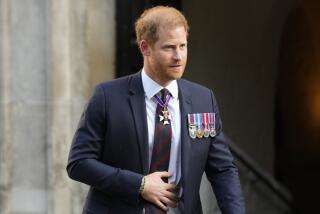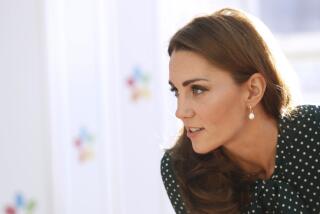Charles and Diana Tried to Manipulate Media Coverage
- Share via
LONDON — Britain’s royal media frenzy has been fed by some unlikely tipsters: Prince Charles and Princess Diana. Both recruited national newspapers to run their side of the story of their now-failed marriage, it was revealed Tuesday.
That disclosure came as part of the growing debate over whether greater restrictions should be placed on the British press, especially this country’s oft-outrageous tabloid newspapers.
The information about Charles and Diana was contained in a leaked letter, written by Lord McGregor, chairman of the Press Complaints Commission. His letter detailed attempts by the royal couple to manipulate coverage of their marital troubles by the media.
His missive went last month to David Calcutt, who last week sent Prime Minister John Major a critical report on the media’s invasion of privacy and called for setting up a statutory body that would supervise newspapers.
But Sunday Times Editor Andrew Neil said that Tuesday’s revelations--particularly those dealing with Britain’s royalty, whose advocates have been among those most critical of the excesses of a largely unfettered media--”cut from beneath the knees the case of those who now want to shackle the press with more rules.”
In his letter, obtained by the Guardian newspaper, McGregor admitted that the royal couple or their friends leaked stories to the press supporting their own positions in the rancorous last years of the marriage of Charles and Diana, who have publicly agreed to separate but not divorce. Further, Major and other senior members of the government knew about the royal news leaks.
McGregor, an eminent social historian, said that in May, 1991, Lord Rothermere, publisher of the Daily Mail and the London Evening Standard, told him at a dinner that the “Prince and Princess of Wales had each recruited national newspapers to carry their own accounts of their marital rifts.”
Rothermere warned McGregor of the problems this could cause for the newly created Press Complaints Commission, which McGregor chairs. McGregor passed the information in late 1991 to Home Secretary Kenneth Baker and to Gus O’Donnell, Major’s press secretary, he said.
Last year, when word got out that author Andrew Morton was publishing a book sympathetic to Diana and antagonistic to Charles, McGregor checked with Buckingham Palace in June to determine whether she had cooperated with Morton. Robert Fellowes, private secretary to Queen Elizabeth II and husband of Diana’s sister, assured McGregor that Diana had not been involved.
On the strength of that word and other information, McGregor, speaking for the Press Complaints Commission, issued a fierce denunciation of the British media.
“The recent intrusive and speculative treatment by sections of the press--and indeed by broadcasters--of the marriage of the Prince and Princess of Wales is an odious exhibition of journalists dabbling their fingers in the stuff of other people’s souls,” he thundered. “Such prurient reporting must add to the burdens borne by children whose lives are affected and greatly increase the difficulties for members of the Royal Family in carrying out their obligations to the public.”
But the next day, Andrew Knight, executive chairman of News International, which prints the Sun and the News of the World, called McGregor to tell him that Diana was “participating in the provision of information for tabloid editors about the state of her marriage and was going to make herself available to be photographed with a friend who was known as one of Andrew Morton’s sources.”
McGregor told key Cabinet ministers, one of whom phoned Fellowes. Faced with widespread government knowledge, Fellowes was forced to call McGregor with an apology.
But he claimed he had given his assurance of Diana’s non-complicity “in good faith.”
McGregor says he realized he went “over the top” in his previous press criticism.
But he did not retract his remarks nor make public his knowledge of the palace’s misinformation.
“The actions of the Princess of Wales in this situation seriously embarrassed the (Press Complaints) Commission,” McGregor wrote Calcutt, “and undermined the purpose of this carefully timed and emotively phrased statement.”
More to Read
Sign up for Essential California
The most important California stories and recommendations in your inbox every morning.
You may occasionally receive promotional content from the Los Angeles Times.













